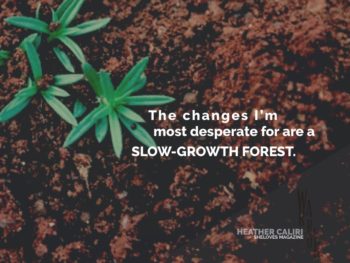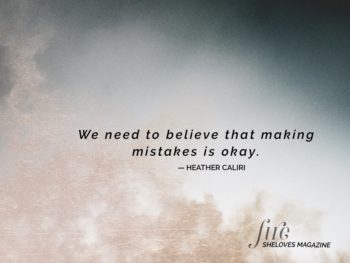I’ve been inspired by Natasha Sistrunk Robinson’s thoughts on faith and mentoring for a while now–and am so honored to have had her join me for a week on mentoring at SheLoves. She graciously agreed to share some more about her journey towards mentoring with us here. I’m convinced that our journeys towards each other–intentional, brave, loving–will transform the hardest problems we face in this world.
How has mentoring transformed you—both being mentored, and mentoring others?
I was mentored by older women who had experienced bumps and cracks in their life, but had gotten up. They were healthy—I think that’s really important, because otherwise the relationships can be damaging.
These women were very clear about who they were in Christ Jesus. They were confident and had their sights set on Jesus; they weren’t trying to make me into someone else.
It was freeing and challenging to be in relationship with them. I didn’t feel pressure to be them, or to make the same life choices they’d made. But I had to think about how I would live as a Christian and as a woman.
Because of them, I grew into my womanhood. That was very transformative.
As a mentor, I find the relationships are very humbling. It is challenging, but I get great joy out of doing it.
Where does the joy come from?
Well, Rick Warren sold millions of copies of The Purpose Driven Life because we all want to know our purpose. We wonder if we’re just here to eat and sleep and poop.
Because I’ve been mentored well, I understand my identity in Christ and I don’t wonder if I’m wasting my life away. I know I’m doing what I’m supposed to do, and when I’m done with my work, Christ will take me home.
Why do you think there’s such a thirst for older women mentoring younger ones? Where does it come from?
The thirst is natural—it’s part of our creation. We all have a desire to belong. When you feel like you’re all alone in the world, that’s not God’s good design for your life. It’s a good thing to seek out community.
Unfortunately, many people don’t have healthy, faithful relationships at home. It’s not an excuse—it’s just the way things are. Even in homes with two parents, many parents are physically present, but they are launching kids who can’t cope in the world. There’s a lot of hurt, broken, and lost people.
Also, people haven’t been trained to mentor and form relationships well. Many people are afraid they’ll screw it up, so they don’t do it at all. People don’t want to intentionally fail.
So they choose to do something else.
When leading the mentoring ministry, I had as many as eleven people on our leadership team—but many more women desired mentoring than those eleven people could accommodate.
So we decided to hold a commissioning service for the sixteen or so women who had been involved in the ministry for three years. Although mentors had invested in them, only two committed to mentor others. If people haven’t discovered how to sacrifice and surrender to God, they may not want to do this challenging work.
In one of your articles encouraging women to go deeper into discipleship, you said, “This Christian journey is not all about how you or I feel.” I have to confess: I have mixed feelings about that—for a long time I ignored my feelings, which didn’t do my faith any favors. And yet we can’t let our fear or hesitation paralyze us. How do feelings play into our faith journey? When are they helpful, and when do they lead us astray?
I definitely agree that we have to be in tune with our emotions. If your conscience is telling you not to do something, then listen. That’s wisdom.
But making disciples is an imperative. It’s not optional for us.
When we fear doing something we know God tells us to do (like make disciples), and we don’t respond in obedience to his command, its sin.
Some people fear mentoring because internally, they’re telling themselves that “success is going to depend on me. Someone will or won’t accept Christ because of me.” That’s a false sense of pride.
Let me be clear: none of us have the ability to change a person’s heart. Only God can do that. When we’re in mentoring relationships with people, we are partnering with God in the transformative work his wants to perform in the heart of an individual. I am simply allowing myself to be used as His tool. We must trust that God will give us everything needed for a life of holiness.
Of course, we all screw up at some point, but it won’t be the end of the world.
The beautiful thing about mentoring is God changes the hearts of the both mentor and the mentee in the process. People who don’t want to change are often not willing to mentor. You can’t go out there and pretend when you’re mentoring others.
I loved this article you wrote about the power of cross-racial and ethnic mentoring. How does mentoring play into racial reconciliation? What power does it bring to the table?
One mistake we make in mentoring is that we assume we need to find someone that looks like us. I don’t mean skin color necessarily. What I mean is: if you’re an engineer, you look for an engineer on an executive team, because they have been through the place where you are and are currently in the position that you want.
But that method of finding mentors doesn’t always mean you’ll be challenged in the way that’s needed. We can all consider how to learn or be stretched by someone who is less like us.
If we’re talking about racial reconciliation in the church, it’s so important for the stakeholders—generally white men on church staffs, conferences, nonprofits, or publications—to be mentored by people of color. People of color have education and experiences that could challenge what the stakeholders might consider norms for everyone.
Racial and ethnic minorities learn from white people all the time—we have to. When racial divisions and injustices are exposed, it reminds us of the urgency of the racial education needed by our white Christian leaders. I would love it if that education were ongoing so we can have a united presentation and application of the gospel when crisis points rise.
I believe that cross-cultural mentoring is an effective tool. For the gatekeepers of power to not perpetrate systems of injustice, it is important that they are willing to sit at the feet of people of color and learn from them.
We can all learn and benefit from healthy mentoring relations. Mentoring God’s way transforms us, defines our purpose, challenges our wants and desires, and brings harmony to our church communities. When God gives you the opportunity to mentor others, just say, “Yes.”
Image credit: OZinOH
 Natasha Sistrunk Robinson is an inspirational speaker, freelance writer, and human trafficking advocate. As a graduate of the U.S. Naval Academy and Gordon-Conwell Theological Seminary (M.A. Christian Leadership), she has over 15 years of experience in leadership and mentoring. She is currently authoring a book about mentoring women from the perspective of intentional discipleship. Connect with Natasha through her official website, blog, Facebook,Twitter, Pinterest, or Instagram.
Natasha Sistrunk Robinson is an inspirational speaker, freelance writer, and human trafficking advocate. As a graduate of the U.S. Naval Academy and Gordon-Conwell Theological Seminary (M.A. Christian Leadership), she has over 15 years of experience in leadership and mentoring. She is currently authoring a book about mentoring women from the perspective of intentional discipleship. Connect with Natasha through her official website, blog, Facebook,Twitter, Pinterest, or Instagram.














 When my scars scare the hell out of me
When my scars scare the hell out of me
[…] Continue reading at Heather Caliri’s blog. […]